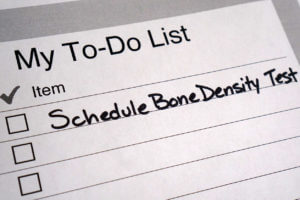
Are you scheduled for a bone density test and feeling anxious about it? Don’t worry, a bone density test is a simple and painless procedure that measures the amount of calcium and other minerals in your bones.
It is an essential test to diagnose osteoporosis and assess your risk of bone fractures. In this blog, we will guide you on how to prepare for a bone density test and what to expect during the procedure.
An Introduction to Bone Density Testing
A bone density test, also known as a DEXA scan (Dual-Energy X-ray Absorptiometry) works by using X-rays to measure how many grams of calcium and other bone minerals are packed into a segment of bone.
Specifically, the bones that are most commonly tested are located in the spine, hip, and forearm. These areas are tested because they are particularly prone to fracturing.
The results of this test helps doctors diagnose conditions like osteoporosis, determine how severe it is, and decide on the best treatment or preventive measures.
Safety of Bone Density Test
One of the primary concerns surrounding any imaging test that uses X-rays, including DEXA scans, is radiation exposure. However, it’s important to note that the amount of radiation received from a DEXA scan issimilar to the amount used in common X-ray procedures.
This means the DEXA scan is a safe and effective tool for measuring bone density and assessing the risk of fractures.
It’s important to note that women who are pregnant or may be pregnant are generally advised to avoid DEXA scans, as even low doses of radiation could potentially harm the fetus.
Who Should Get a Bone Density Test
If you are over 50, have a family history of osteoporosis, or have other risk factors such as smoking or a previous broken bone, you should get a bone density scan.
How to Prepare for a Bone Density Test
Preparation for a bone density test is relatively simple and straightforward.
Discuss Medications with Your Healthcare Provider
Some medications such as calcium supplements can interfere with the results of a bone density test. Be sure to tell your healthcare provider about any prescription or over-the-counter medications or supplements you’re taking. You may need to stop taking certain medications a few days before the test.
Dress Comfortably
Wear comfortable clothing free of metal zippers, belts, or buttons, as they can interfere with the scanning process. If you do wear clothing with these items, you may be asked to change into a hospital gown for the test.
Avoid Certain Procedures
If possible, schedule the bone density test at least 10 days after any procedure that involves barium or contrast dye, such as a CT scan or MRI with contrast, as these can affect the results.
Gather Your Documents
Before your scan, gather your necessary documents such as insurance care, a photo ID, and other necessary documents.
What Happens During a Bone Density Test
A bone density test is a quick, painless procedure that typically lasts about 10 to 30 minutes.
Positioning
You will lie on a padded table while a scanner passes over your body. The scanner usually focuses on your hip and lower spine, but in some cases, the forearm may be scanned.
Scanning
The machine uses low-dose X-rays to measure the amount of minerals in your bones. You’ll need to stay still during the scan to ensure accurate results.
After the Test
After the scan, you can return to your normal activities immediately. Your healthcare provider will review the results and discuss them with you at a follow-up appointment.
Results
The test results are given in two values: a T-score and a Z-score. The T-score compares your bone density to the average score of a healthy young adult, while the Z-score compares your results to the average scores of people your age and sex.
Interpretation
A T-score above -1 is considered normal. Between -1 and -2.5 indicates low bone density or osteopenia, and a score below -2.5 signifies osteoporosis.
Bone Density Test in Colorado Springs, CO
At Abundance Health Care, we prioritize your health and well-being. Our highly trained and skilled healthcare provider recommends a wide range of diagnostic tests, including the DEXA bone density scan, to provide you with valuable insights into your bone health, enabling you to make informed decisions about your healthcare.
If you would like to learn more about bone density tests or want to make an appointment with our nurse practitioner Dr. Bruner-Hill, contact our staff today at (720) 869-0547 or request an appointment online. We look forward to serving you!


